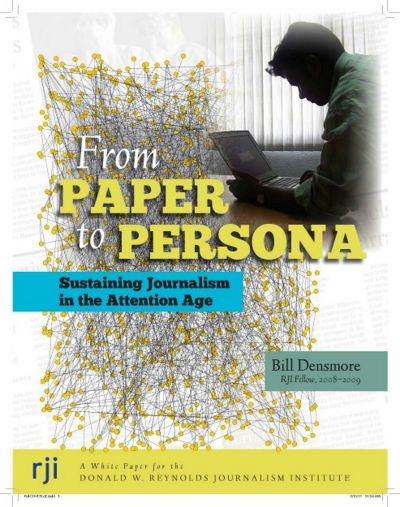Difference between revisions of "Persona"
(→A call to action:Time to make the marketplace for privacy, trust, identity and information commerce) |
(→A call to action:Time to make the marketplace for privacy, trust, identity and information commerce) |
||
| Line 3: | Line 3: | ||
='''A call to action:'''<br><br>''Time to make the marketplace for privacy, trust, identity and information commerce''= | ='''A call to action:'''<br><br>''Time to make the marketplace for privacy, trust, identity and information commerce''= | ||
<big>As the news and paper come unglued, what will pay for journalism in the new news ecosystem? We need a new digital marketplace for information. Managing information overload is an opportunity. That’s what this forthcoming white paper is about. It suggests how publishers can cultivate customized, one-to-one relationships with users, provide them personalized information, and get paid for doing so.</big><br> | <big>As the news and paper come unglued, what will pay for journalism in the new news ecosystem? We need a new digital marketplace for information. Managing information overload is an opportunity. That’s what this forthcoming white paper is about. It suggests how publishers can cultivate customized, one-to-one relationships with users, provide them personalized information, and get paid for doing so.</big><br> | ||
| + | |||
<hr> | <hr> | ||
==[http://www.newshare.com/whitepaper.pdf DOWNLOAD THE WHITE PAPER]== | ==[http://www.newshare.com/whitepaper.pdf DOWNLOAD THE WHITE PAPER]== | ||
<i>Includes two-page executive summary</i> | <i>Includes two-page executive summary</i> | ||
| − | + | <br>A growing attention economy is transforming the news business. It represents for the institutions which practice journalism a chance to survive beyond the era of mass-market advertising, by becoming “information valets” for their readers, viewers and users. Trust, access, identity and value are core issues, affecting convenience, privacy and personalization. The attention economy will invite new collaboration among news, advertising, publishing, entertainment, technology and philanthropic services. | |
Thus the defining challenge for news organizations in the 21st century is no longer managing proprietary information, but helping the public manage our attention to ubiquitous information. In less than a decade, we have moved from a world of relative information scarcity -- access restricted by a variety of technical choke points -- such as presses -- to a world of such information abundance that the average user's challenge is not how to access information, or even how find it, but how to personalize, trust and make sense of it. | Thus the defining challenge for news organizations in the 21st century is no longer managing proprietary information, but helping the public manage our attention to ubiquitous information. In less than a decade, we have moved from a world of relative information scarcity -- access restricted by a variety of technical choke points -- such as presses -- to a world of such information abundance that the average user's challenge is not how to access information, or even how find it, but how to personalize, trust and make sense of it. | ||
Revision as of 19:15, 21 April 2011
Contents
DISCUSSION DRAFT OF FORTHCOMING WHITE PAPER
A call to action:
Time to make the marketplace for privacy, trust, identity and information commerce
As the news and paper come unglued, what will pay for journalism in the new news ecosystem? We need a new digital marketplace for information. Managing information overload is an opportunity. That’s what this forthcoming white paper is about. It suggests how publishers can cultivate customized, one-to-one relationships with users, provide them personalized information, and get paid for doing so.
DOWNLOAD THE WHITE PAPER
Includes two-page executive summary
A growing attention economy is transforming the news business. It represents for the institutions which practice journalism a chance to survive beyond the era of mass-market advertising, by becoming “information valets” for their readers, viewers and users. Trust, access, identity and value are core issues, affecting convenience, privacy and personalization. The attention economy will invite new collaboration among news, advertising, publishing, entertainment, technology and philanthropic services.
Thus the defining challenge for news organizations in the 21st century is no longer managing proprietary information, but helping the public manage our attention to ubiquitous information. In less than a decade, we have moved from a world of relative information scarcity -- access restricted by a variety of technical choke points -- such as presses -- to a world of such information abundance that the average user's challenge is not how to access information, or even how find it, but how to personalize, trust and make sense of it.
The Internet as we know it today is not up to this task. With a new, public-benefit initiative, it will be.
REFERENCE LINKS
An Information Trust Association will recognize in its governance structure the interests of at least four different constituencies: rights-holders (authors/artists), publishers (aggregators), audience-owners (banks, publishers, billers etc.), and end-users.
